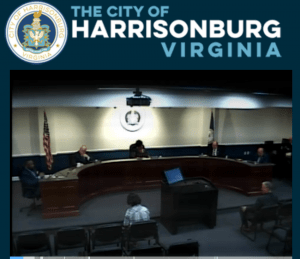
Harrisonburg City Council streams a city council meeting in March and debates public electronic participation.
Post by Ethan Gardner, JMU Political Science, ’20
The COVID-19 public health crisis has quickly changed the functioning of our society. Public health officials have made universal calls for social distancing, meaning people should limit direct contact with others and avoid any non-essential gatherings of people. The deliberative work of public bodies, from local City Councils, School Boards, local commissions, to the highest levels of state and federal offices, are premised on the gatherings of people to debate and decide on matters of public concern. Elected representatives gather together to debate and vote. Members of the public attend meetings in crowded rooms to hear from their representatives and share their comments. This is now a threat to public safety. To maintain democratic institutions in these extraordinary times, public officials have a responsibility to redesign their systems of public participation, accountability and transparency.
On Friday, Virginia Attorney General Mark Herring released an opinion regarding how local governments and public organizations should conduct public meetings during the COVID-19 outbreak. It suggests that pertinent decisions to the current outbreak are allowed to be held electronically under Virginia law. But it also notes that “the General Assembly did not intend to permit public bodies to handle all business through electronic communication” even during a state of emergency, so there should be consideration of whether decisions can be delayed until in-person meetings are possible. The opinion is clear that Virginia code “does not permit all meetings of a public body to be conducted electronically” because it only provides for decisions relevant to the state of emergency.
This opinion gives room to local governments and public boards to conduct their business where it touches the COVID-19 outbreak, but it leaves other important decisions to be left unmade while we collectively wait out the pandemic. It abides by current Virginia law, but as we hunker down for the coming months it is important to question whether conducting the people’s business electronically could work for the good of Virginia.
Legislative bodies are also being forced to reconsider how they conduct their business and count votes, as staffing offices and holding in-person meetings becomes more dangerous. Senator Rand Paul became the first US Senator to test positive for COVID-19, though many other Congress members have been forced to self-quarantine due to possible contact with the virus. The growing possibility of exposure is opening discussions of how to conduct digital votes, including Hawaii Senator Brian Schatz openly calling on Congress to do so. Multiple members of the Virginia General Assembly have called for an emergency session to be called by Governor Northam to pass emergency legislation, but the safety of lawmakers and their staff during this proposed session remains at risk.
Modern technology presents more possibilities than ever for public bodies to remain transparent and gather public opinion while making decisions. Live-streaming public deliberations has been commonplace for years now, and there are many services available to host open webinars and video chats. These services often have comment sections built in to allow for commentary from an audience of stakeholders. In situations like the unprecedented one we are in today, these tools could be utilized by public bodies that still need to make important decisions.
While the advance of technology has made digital inclusion and public participation possible, we should be aware of the inequity that it could exacerbate. Consistent access to the internet, through functional wifi or broadband, is far from guaranteed in all places. There are many locations in Virginia, including many low income, rural, and communities of color where access to the internet is sparse. Many community locations like libraries where the internet is usually available to all have been shut down due to safety concerns during the pandemic. We cannot claim to have transparency or an inclusive democracy if certain people are locked out of accessing it.
We are in unprecedented times due to the spread of COVID-19, and it is unclear when society can return to any semblance of normal, but these questions of transparency and public inpclusion on decisions made by elected and unelected public officials are foundational to democracy. Before we were forced into self-isolation, broad inequities existed in who attends public meetings and participate in politics. Right now is an opportunity to reimagine public decisions by using the digital tools at our disposal, from open streaming of public deliberation, social media, online dashboards, and digital mapping to electronic voting by elected officials.

Recent Comments